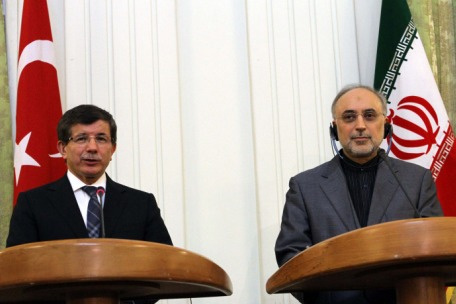Ankara’s Inclination towards the West in Facing Tehran

Iranian Diplomacy: What is Turkey’s position with regard to sanctions on Iran?
Bahram Amir Ahmadian: It seems that Turkey’s position is its national interests. What is happening in Turkey right now, such as the decision to buy less oil from Iran or other issues, is certainly based on its national interests. This amount of oil will surely be provided by other sources like Saudi Arabia or Iraq, particularly considering the fact that the issue of Iraq’s oil exports and especially from Kurdistan to Turkey has entered a new phase. It is possible that Turkey will be able to provide for its needs through other sources. On the other hand, Turkey intends to keep its good relations with the West. Therefore, Turkey will have inclinations towards the West and make efforts to meet the demands of the Western countries. Turkey’s recent discussions to coordinate itself with the European Union might also affect this decision. In general, all of these elements have been effective in Turkey’s decision regarding its relations with Iran.
ID: Turkey had declared in the beginning that it does not recognize and enforce unilateral sanctions against Iran. Can this issue be a violation by Turkey of US sanctions against Iran?
BA: Turkish officials had announced that they would not support unilateral sanctions against Iran. But under present circumstances, if the report that Turkey’s oil imports from Iran will be reduced is correct, Turkey’s actions indicate that it has acted contrary to its promise and in line with the US and the EU, which have stated that they will reduce or cut their oil imports from Iran from the end of June on.
ID: There have been reports that the US will not sanction several countries which have reduced their oil imports from Iran. One of these countries is Turkey. Can it be assumed that a deal has been made between these countries and the US?
BA: Yes. It seems that a deal is being made in this regard. This is because the US has no choice but to accept certain limitations these countries have in order to completely cut off their trade with Iran.
ID: How effective has the atmosphere of Iran and Turkey’s bilateral relations been on Turkey's cooperation with the West?
BA: I think recent developments in the region are not conducive for Iran to cut relations with its old neighbor with which it has, for many years, had considerable economic relations. It is possible to have a reaction to Turkey's measures; however, this reaction will be commensurate with the extent to which Turkey has followed its measures. A twenty percent reduction in Turkish purchases of Iranian oil can lead to losses for Iran. Therefore, in order to compensate for the losses and even retaliate, Iran has certain instruments. For example, Iran can reduce imports from Turkey. It is natural that when Turkey does not buy oil from Iran, economic resources that Iran allocates for opening credit in its banks will be reduced. For its part, Iran will harden its position with regard to the opening of credit for buying products from Turkey. For this reason, it seems that this measure will be compensated in transactions between the two sides and, in my opinion, Turkey will also face losses.
ID: Before recent developments in Syria and then in Iraq, it seemed that Turkey was considered as an avenue for bypassing sanctions. In your opinion, does this view continue to be held or have these developments affected this view?
BA: Enforcing bank-related sanctions has created numerous problems for the opening of credit in the banking system. Iran has made agreements with countries such as India, with which it has expanded relations, to find a way out of this situation. One of these solutions was barter trade or even exchange with gold. New sanctions will also be added from the end of June. Based on this reason, the Foreign Ministry has pondered these issues and, therefore, can find solutions to move around these sanctions with its economic partners.
But Turkey, as a neighbor and as a place to reduce the effects of international sanctions, plays an important role in this process. I believe that the step that is now being taken will not have a serious impact on economic relations between Turkey and Iran, for they are nonetheless neighbors. They can continue their economic trade through barter or other methods. In my opinion, not only Turkey, but Iran's other neighbors can also be effective in breaking the sanctions against Iran.
On the other hand, Iran must pay more attention to the issue of domestic production. Iran has a consumer market of 75 million people, and if Iranian-made goods find their way into this market, there will be no need for imports. Besides, the media, in my opinion, has a major role in reducing the political impact and effects of these sanctions. For this reason, as this year has been named by the Supreme Leader as “the year of national production”, the media can help neutralize these sanctions by strengthening national solidarity and promoting domestic production.

